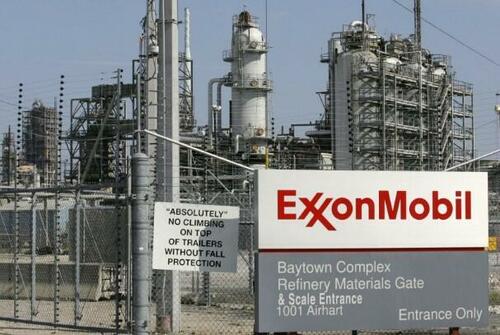If there was any doubt left in your mind whether or not the oil and gas industry is literally running like greased lightning nowadays, it has been reported that ExxonMobil is still seeking out new M&A opportunities - even after the firm's massive $60 billion acquisition of Pioneer.
After the company's blowout earnings and hiked dividend to end the week, CFO Kathy Mikells told Financial Times that the supermajor is still on the prowl opportunities: “It’s important to say that we’re always looking. Many times I’ve described us as very inquisitive but also very picky. A deal has got to be what we say is ‘one plus one equals three’.”
“It’s important to understand that we’re in a depletion business with upstream. I think [the deal] puts us in a good position for the long term,” she added.
Exxon CEO Darren Woods said on Friday: “Pioneer will help us grow supply to meet the world’s energy needs with lower carbon intensity while Denbury improves our competitive position to economically reduce emissions in hard-to-decarbonize industries.”
Pioneer is the leading player in the Permian Basin, FT notes, a key hub for America's oil industry that stretches across Texas and New Mexico. Exxon's acquisition of Pioneer will secure it a commanding role in the oilfield, contributing to 15% of the total crude production.
This marks Exxon's second major deal this year, following its $5 billion acquisition of Denbury Resources in July to enhance its carbon management capabilities. Denbury owns the U.S.'s largest CO2 pipeline network. Related: Emergency Oil Meeting Discusses Potential For Diesel Outages
Exxon reported earnings of $9.1 billion for the quarter, slightly lower than analyst expectations of $9.6 billion. But it likely won't matter heading into the back end of 2023 with geopolitical tensions on the rise and a consistent bid likely under the price of crude well into 2024.
Here is what the company reported for Q3:
- Total revenues & other income $90.76 billion, beating estimates $88.81 billion
- Adjusted EPS $2.27 vs. $4.45 y/y, missing estimates of $2.37
- Total Q3 earnings: $9.1BN, up $1.2BN from Q2
- Upstream adjusted net income $6.14 billion, -48% y/y, beating estimates of $6.07 billion
- Energy products adjusted net income $5.55 billion, +0.3% y/y, beating estimates of $3.12 billion (2 estimates)
- Chemical products adjusted net income $249 million, -69% y/y, missing estimates of $377.8 million
- Specialty products adjusted net income $619 million, -19% y/y, beating estimates of $588.2 million
On Thursday, it was also reported that an Exxon Mobil-led consortium made a "significant" oil and gas discovery in Guyana, per the country's energy ministry. The Lancetfish-2 well is the fourth such find this year, increasing the total discoveries to 46 since 2015, with over 11 billion barrels recoverable.
Most discoveries are in Exxon's Stabroek block, expected to yield 1.2 million barrels per day by 2027. The Lancetfish-2 find adds an estimated 20 meters of hydrocarbon-rich reservoir and 81 meters of additional hydrocarbon-bearing sandstone.
Meanwhile, the entire industry has already been ripe with M&A this year. Not only has ExxonMobil dealt for Pioneer, but competitor Chevron announced a $53 billion takeover of Hess this past week.
Chevron CFO Pierre Breber was cagier about whether or not they would be looking into more M&A: “We’re focused on this transaction. It’s a big transaction . . . we’ll focus on executing this one well.”
CEO Mike Wirth told Financial Times that Chevron is “investing to profitably grow our traditional and new energy businesses to drive superior value for shareholders”.
By Zerohedge.com




















Two major strategic factors are underpinning the changing balance of power in the global oil market. One is the fact that the last three barrels of oil produced will come from three regions of the world, namely the Arab Gulf region, Venezuela’s Orinoco Belt and Russia’s Arctic.
The second factor is rising resource nationalism. The power structure of global oil markets is already undergoing a major transformation exemplified by the rising power of the National Oil Companies (NOCs) and the declining influence and power of the International oil companies (IOCs).
Whilst top IOCs such as Total, BP, Shell, Chevron, ENI, ConocoPhillips, ExxonMobil, Equinore and Repsol have remaining reserves estimated to last from 8.0-10.0 years, the NOCs of countries like Saudi Arabia, Iraq, UAE, Venezuela, Russia and Kuwait have access to proven reserves which could last up to 91 years at current production levels. Without new reserves, IOCs’ production will decline precipitously. For instance, oil supermajor Shell expects to have produced 75% of its current proven oil and gas reserves by 2030, and only around 3% after 2040.
This transformation has been inevitable since the birth of OPEC sixty three years ago but the real catalyst is rising resource nationalism.
High oil prices have enhanced the bargaining power of oil-exporting countries. As a result IOCs have struggled to secure access to new oil reserves and their production has dropped in recent years.
Dr Mamdouh G Salameh
International Oil Economist
Global Energy Expert